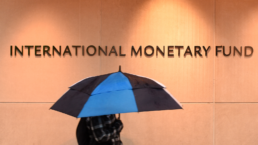The International Monetary Fund (IMF) claims to help countries in need, but in reality helps enforce austerity worldwide.
By David Adler, The Guardian
This week, the board of governors of the International Monetary Fund (IMF) will gather at its headquarters in Washington DC to reaffirm the Fund’s three-part mandate: financial stability, economic strength, and – as its managing director, Kristalina Georgieva, recently asserted – international solidarity. “I am determined that we will support our members however we can,” Georgieva said of the Fund’s new spirit. “Now is the time to take advantage of this opportunity to build a better world.”
Georgieva is right: it is now or never. The “largest spate of debt crises” in a generation hangs over the global south. Two ingredients compose this ticking debt bomb: rapidly rising levels of public debt among the world’s poorest countries, and a rapidly rising percentage of that debt issued at variable interest rates. The combination of these two ingredients mean that even minor rate hikes in rich countries will have explosive consequences across the developing world – just as supply chains seize, food prices soar and the Covid-19 pandemic rampages through the world’s under-vaccinated populations.

In short, the global south has never needed more support in its search for stability, strength and solidarity. But even a cursory glance of the IMF’s global activity reveals a systematic violation of this mandate, inflaming – rather than resolving – the crises of health, hunger and habitat that combine in the world’s poorest countries.
Consider Argentina. In 2018, the IMF ignored warnings from its own staff to push through a $57.1bn loan to the Republic of Argentina under President Mauricio Macri: the largest loan in the history of the Fund. Did the loan deliver on the IMF’s mandate of financial stability? The opposite: inflation rose, employment fell and capital fled the country at record rates. Now, well after Macri has been evicted from office, the people of Argentina continue to pay the price. Argentina’s economy minister, Martín Guzmán, put it bluntly in his letter to Georgieva last month: “None of the objectives of the program were achieved.”
Recent Posts
‘Unconstitutional. Unethical. Authoritarian.’ ICE Bars Millions Of Immigrants From Bond Hearings
July 18, 2025
Take Action Now One watchdog said the new policy “seems like a blatant attempt to stop them from exercising their right to due process.”……
Americans Are Not Nearly Alarmed Enough About Climate Change
July 18, 2025
Take Action Now Americans still don’t comprehend how imminent, dangerous, and far-reaching the threat is—and journalists are partly to blame.By…
The IRS Is Building A Vast System To Share Millions Of Taxpayers’ Data With ICE
July 17, 2025
Take Action Now ProPublica has obtained the blueprint for the Trump administration’s unprecedented plan to turn over IRS records to Homeland Security…
Israel’s Sudden Assault On Syria Is Unchecked Aggression
July 17, 2025
Take Action Now Jerusalem is bombing Damascus and threatening al-Sharaa’s rule, while Washington was hoping to help the nascent government on…




